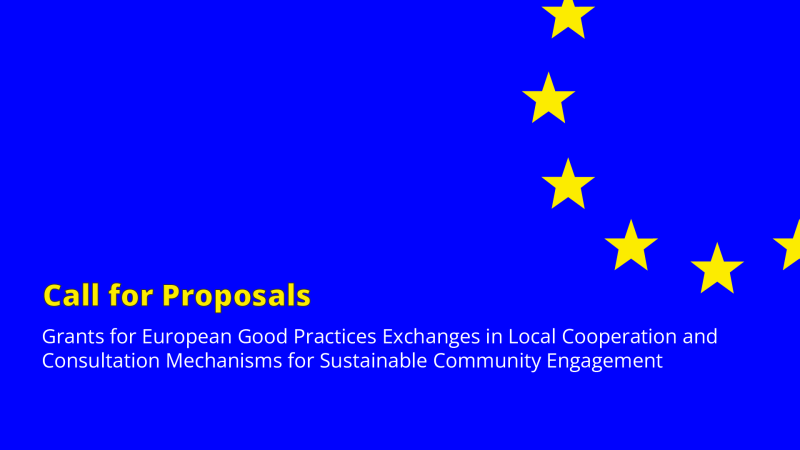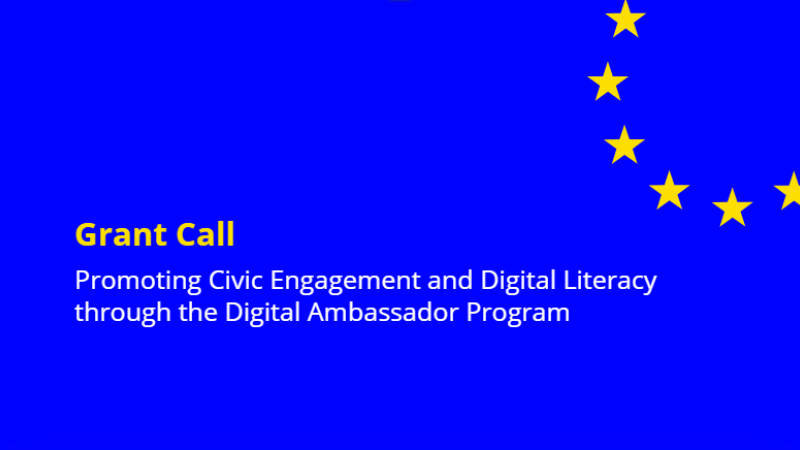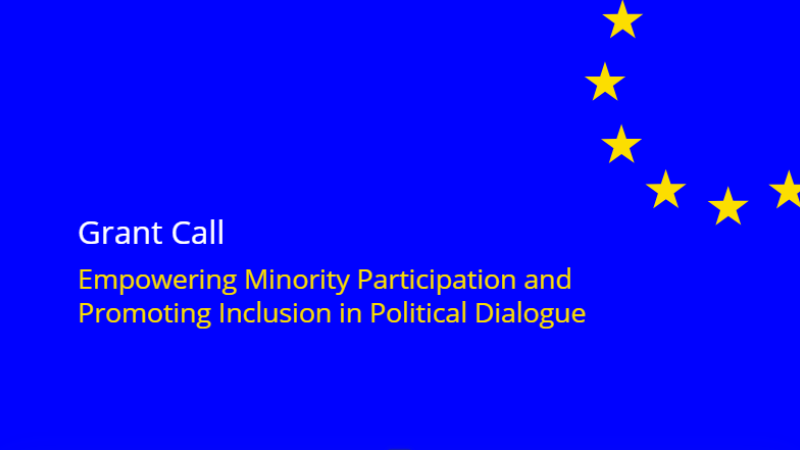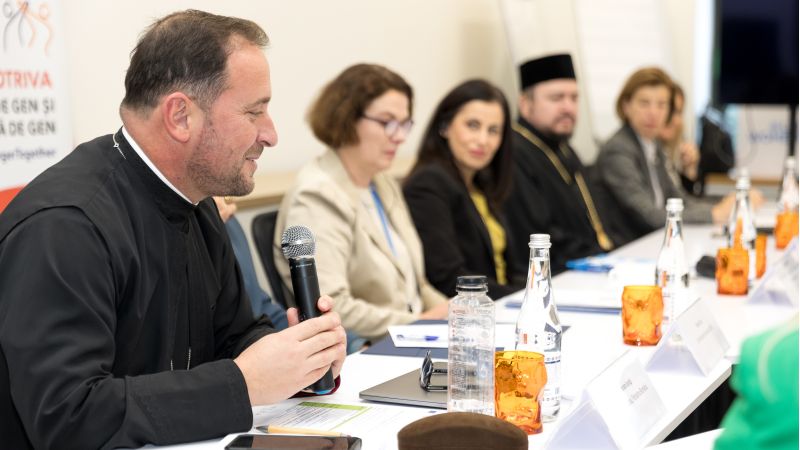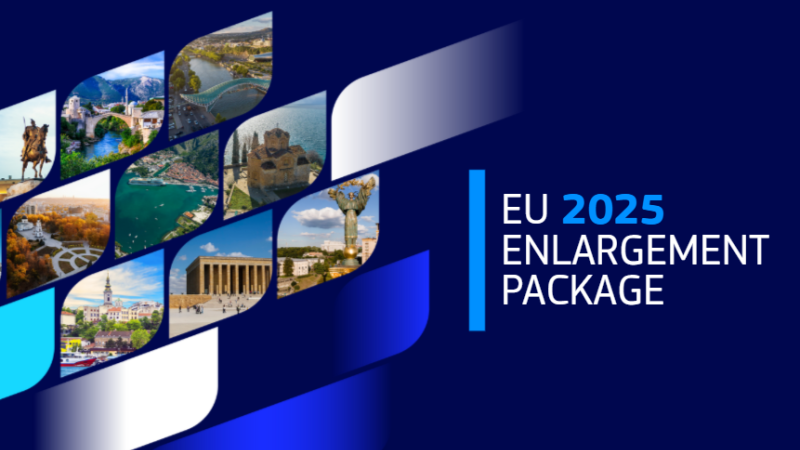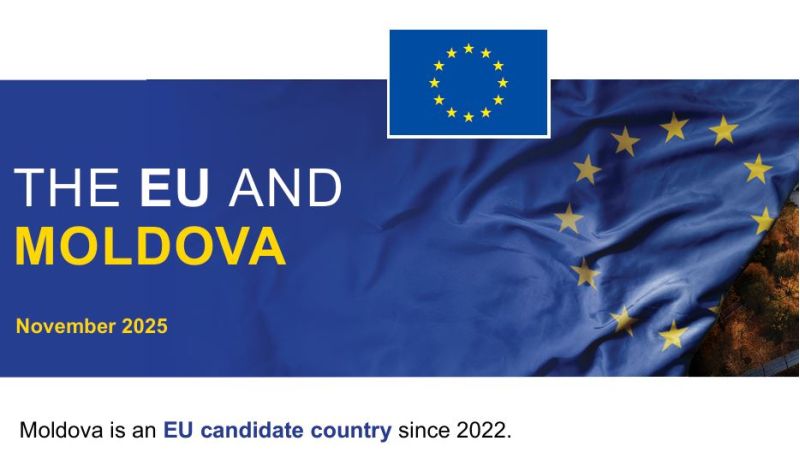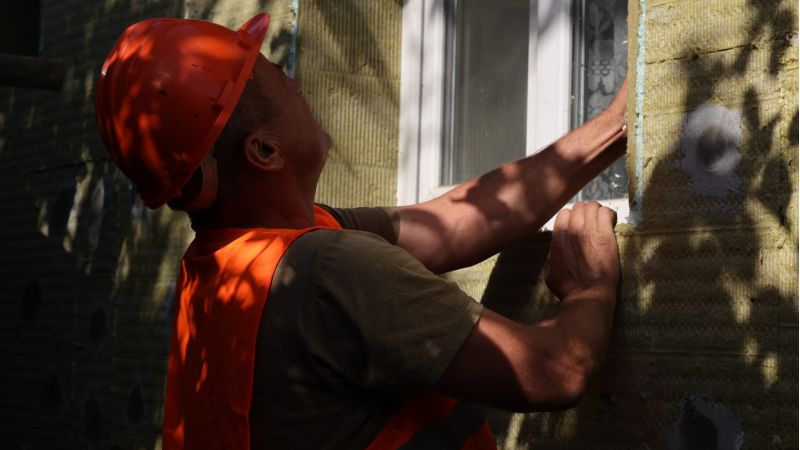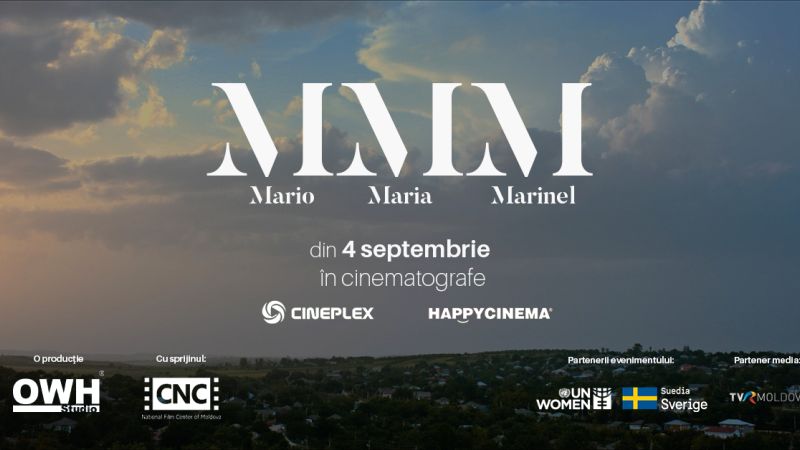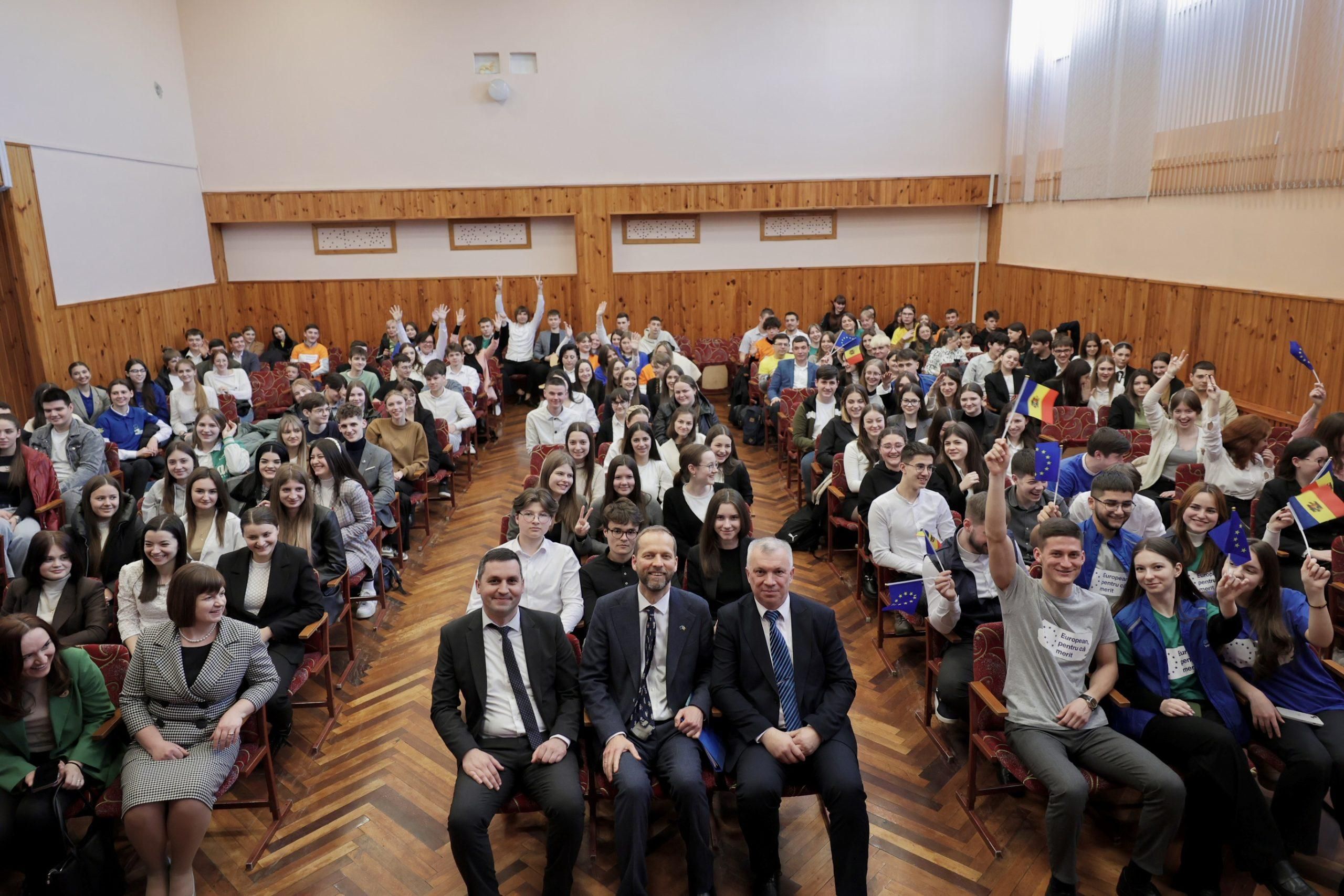
EU TALKS SOROCA: QUESTIONS & ANSWERS
The young people of Soroca welcomed the Ambassador of the European Union to the Republic of Moldova, Jānis Mažeiks, in their community. They seized the opportunity to discuss matters of interest for youth, to ask questions and share opinions. Find out the answers to the youth questions.
- Calin Rudei, Liceul Petru Rareș: How does the EU address the corruption in Moldova and what measurements are being taken against it?
Jānis Mažeiks, EU Ambassador to the Republic of Moldova: Corruption is a key obstacle to democratic governance, rule of law, and economic development.
Cleaning up the judiciary and the fight against corruption, which is among the conditions imposed on the Republic of Moldova by the European Commission, is a difficult task, but Moldova must make every effort to progress in this segment. The EU is committed to assisting Moldova in addressing this issue. The EU’s support includes financial assistance, technical expertise, and capacity building to strengthen anti-corruption measures in the country.
- Ion Andries, Gimnazium Racovăț: We can imagine how hectic is you agenda, but we wish and hope to meet more often with you and discuss the democratic and economic challenges Moldova faces.
Jānis Mažeiks, EU Ambassador to the Republic of Moldova: I would also love to meet more often. Your opinions and solutions hold great significance for me. You, the young generation, bring change and offer fresh, innovative perspectives in addressing the challenges of today. You are the future; you are able to shape your own life and the European perspective of your country. The power and the future are in your own hand, just act!
- Eduard Petrov, Liceul Petru Rareș: How is the connection between youth from EU and beyond, in the aspect of promotion of voluntary engagement, educational mobility and society development, and what is the role of EU in supporting youth engagement?
Jānis Mažeiks, EU Ambassador to the Republic of Moldova: The EU plays a significant role in supporting youth engagement by providing funding, facilitating mobility, promoting volunteering opportunities, and developing policies that address the needs of young people. Through initiatives like Erasmus+ and the European Solidarity Corps, the EU aims to empower young individuals, foster cross-cultural understanding, and contribute to societal development both within the EU and globally. As well, the European Young European Ambassadors initiative which is a non-political, voluntary, vibrant communication network connects and builds bridges of friendship among young people. I am happy to see the European Young Ambassadors from Moldova joining our EU Talks in Soroca.
- Vlada Rublenco, Liceul Constantin Stere: Talking about major implementations, how would the European Union impact inflation rate and economic boost of Moldova? /
Jānis Mažeiks, EU Ambassador to the Republic of Moldova: The Republic of Moldova has autonomy in economic and monetary decision-making and is not part of the euro area. However, EU cooperation and support can play an important role in improving economic stability and inflation in the Republic of Moldova through financial assistance and structural reforms, trade agreements and exports. The European Union is today Moldova’s largest trading partner, accounting for more than 58% of total exports.
- Cezar Tofan, Liceul Constantin Stere: What are the main challenges facing the EU today and how are they being addressed in practice?
Jānis Mažeiks, EU Ambassador to the Republic of Moldova: Russia’s unjustifiable invasion of Ukraine has put at the top of the European political agenda the supply security, investments in energy efficiency and renewable sources. As energy security becomes imperative, we put climate-related investment needs at the centre of our growth model. We use the green transition to digitalize the European economy, reduce global emissions and increase productivity growth.
The Russian aggression stresses the growing importance of security and investments in the defense sector. The EU is boosting cooperation in its Member States and in neighboring countries for a safer Europe, including the Republic of Moldova. The EU budget is adjusted to respond to the multiple new crises created by Russia’s invasion of Ukraine and unforeseen events. Recovery and resilience initiatives remain vital in 2023 requiring new resources and reforms in European and national interests. Keeping investments alive for a better and more resilient Europe is a must. The answer for the EU challenges is sticking together. Let there be no doubt: Europe can adapt and thrive.
- Nicoleta Patrasco, Liceul Constantin Stere: What are the biggest current challenges facing the EU in promoting democratic values and respect for human rights in third countries, and what strategies is EU adopting to overcome these obstacles?
Jānis Mažeiks, EU Ambassador to the Republic of Moldova: The European Union helps third countries to advance in defending and securing fundamental human rights. A major challenge is managing relations with countries that adopt authoritarian policies and do not respect human rights. The EU uses diplomatic tools, such as political dialogue, to pressure and influence these countries to respect human rights. The EU can also impose sanctions and restrictions on trade and financial aid for serious human rights violations. In the case of geopolitical tensions and conflicts, we apply mediation, diplomacy, and support for peace processes in the affected countries. Similarly, the EU provides financial and humanitarian support for post-conflict reconstruction and development.
To address the challenges mentioned above, the EU attaches particular importance to international cooperation. This includes working in partnership with international organisations such as the United Nations (UN) and the Council of Europe, and working with other regional and international actors to promote democratic values and respect for human rights.
- Andronic Daniela, Colegiul M. Eminescu: What would be the best way for young people in Soroca to promote cultural and educational exchange between the city and the region, Soroca and other European cultural cities?
Jānis Mažeiks, EU Ambassador to the Republic of Moldova: Currently, the European Union has almost 20 opportunities – programs, projects, initiatives, etc. – for young people from the Republic of Moldova, including ERASMUS+, which recently expanded its initiatives for young people who are 13 years old. Or, other opportunities such as: the European Eastern Partnership School, Vibe Academy, EU4Youth, NEET Inclusion, Creative Europe, DiscoverEU, Initiatives allowing young people from Moldova to participate in practical internships. At the same time, there are initiatives and opportunities in specific areas oriented towards young people, like EU4Business, EU4Digital, EU4Culture, which allows younger people to access funds and grants in various areas, such as IT, Culture & Art and others.
- Anastasia Marginean, Liceul Petru Rareș: How can we initiate partnerships designed to mobilize: whereby the voice of young people is better heard in policy and decision making.
Jānis Mažeiks, EU Ambassador to the Republic of Moldova: Young people are the drivers of change, precisely for this reason the last two years – 2022 and 2023 – the EU has put a special emphasis on the younger generation by declaring these years as the European Year of Youth and the European Year of Skills. There are already strong youth engagement initiatives here in Moldova, such as EuroClubs, European Young Ambassadors, National Centers for Youth. Join forces with them to amplify your collective voice and benefit from their experience and resources.
Also, seek opportunities to engage with policymakers, government officials, and representatives at various levels. Recently, a new joint internship program of the European Union and the Government of the Republic of Moldova was announced. Thus, you can have two months of work in public institutions side by side with public authorities, stipend paid during this period and mentors High Councilors of the European Union. I encourage you to explore www.eu4moldova.eu or the FB pages of the EU Delegation in Moldova and Europe Cafe to be on track with opportunities related to youth participation in policy and decision making.
9. Cătălin Mușcinschi, Liceul Constantin Stere: How can we get opportunities to acquire new skills, spend time abroad learning a foreign language and last but not least, return home with unforgettable memories?
Jānis Mažeiks, EU Ambassador to the Republic of Moldova: There are plenty of opportunities – projects, programs, initiatives – which bring you transformative experience. I will list just a few of them: ERASMUS+, European Eastern Partnership School, EU4Youth, NEET Inclusion, Creative Europe, DiscoverEU, EU4Business, EU4Digital, EU4Culture. Visit www.eu4moldova.eu or the FB pages of the EU Delegation in Moldova and Europe Cafe to find out more information about the existing and new opportunities. Embrace the chance to learn, grow, and make unforgettable memories.
- Alexandru Florea, Liceul Constantin Stere: Is it better for Moldova’s young specialists to go abroad to support other EU countries or to stay in Moldova and work to boost Moldova’s EU accession?
Jānis Mažeiks, EU Ambassador to the Republic of Moldova: It is an individual choice to be made by everyone according to own’s priorities, financial possibilities, and opportunities. Both options have advantages and disadvantages, and each person must consider their own circumstances in making such a decision. I want Moldova to become a full member of the European Union as soon as possible and then everyone’s choice will be made on behalf of and for the good of the EU.
- Denis Gupcovschi, Liceul Ion Creanga: What changes must be implemented in the Republic of Moldova in different areas of activity for modernization and successful integration in the European Union?
Jānis Mažeiks, EU Ambassador to the Republic of Moldova: The EU accession is a process and is based on established criteria and conditions. For Moldova the following 9 conditions are equally important and has to be implemented:
- Justice reform;
- Fixing deficiencies in electoral legislation;
- Fighting corruption at all levels;
- De-oligarchization and reducing the influence of private interests;
- Strengthening the fight against organised crime;
- Improving public services, public administration reform;
- Involvement of civil society in decision-making processes at all levels;
- Improving public procurement at all levels of government;
- Protection of human rights and combating gender-based violence.
The Republic of Moldova has made considerable efforts and achieved progress in carrying out reforms in various fields requested by the European Union. In October, the progress report will be published and for the first time you will be able to see the EU’s assessment toward fulfillment of the above-mentioned conditions.
12. Ion Molceanovschi, Colegiul de Arte Nicolae Botgros: What is the public opinion in the European Union and how will it help us with the reunification of the Republic of Moldova with the mother country Romania?
Jānis Mažeiks, EU Ambassador to the Republic of Moldova: The Republic of Moldova is a sovereign and independent state. The European Union supports the international efforts aimed at strengthening the sovereignty and territorial integrity of the Republic of Moldova and does not get involved in the state’s policy decisions.
13. Ion Molceanovschi, Colegiul de Arte Nicolae Botgros: What is the implementation plan to combat money laundering for the successful implementation of investment projects so that the final results are qualitative and lasting for sustainable development?
Jānis Mažeiks, EU Ambassador to the Republic of Moldova: The European Union continues to be a strong supporter of democratic reforms in the Republic of Moldova, providing assistance for building and strengthening transparent and accountable institutions. In April 2023, the European Union, in partnership with the Council of Europe, announced six new projects aimed at modernizing the administration of justice, facilitating women’s access to justice, combating economic crime, as well as increasing the effectiveness of the fight against money laundering and combating the financing of terrorism, as part of of the third stage of the Partnership for Good Governance Program (2023-2027).
14. Damian Vrâncean, Liceul Constantin Stere: What are the main problems the education system in Moldova is facing? What are the government’s policies and strategies for developing and improving the education system, because it seems to me that the education system in Moldova is boring and irrelevant?
Jānis Mažeiks, EU Ambassador to the Republic of Moldova: Education remains one of the priorities of the Action Plan (2023) of the European Union for the Republic of Moldova. The basic priorities of the system for the next period can be found in the RM-EU Association Agreement and the Association Agenda for the period 2021-2027 and include digitization in education and research, the modernization of the infrastructure of the educational system at all levels of studies, the strengthening of human capital in education and research, modernization of vocational technical education with emphasis on dual education. The European Union grants financial assistance for the modernization of the educational and research system in the country, as well as support for the promotion of youth policies, through projects such as Erasmus +, Horizon Europe, EU4Youth, but also through the Budget Support Project for Technical Vocational Education.
15. Nițorean Mădălina, Liceul Constantin Stere: We stand in solidarity with our neighbours in Ukraine and know that the EU has provided and is providing humanitarian aid to both Ukraine and Moldova. Will this EU aid continue in the future regardless of the war duration?
Jānis Mažeiks, EU Ambassador to the Republic of Moldova: The EU stands firmly with Ukraine and the Ukrainian people and will continue to resolutely support Ukraine’s economy, society, armed forces and future reconstruction.
16. Gabriel Bantiș Gabriel, Liceul Constantin Stere: Why are microtransactions and loot boxes that promote gambling from online video games and websites are still not banned in the EU? The damages and losses that they produce is significant for the young generations, developing their gambling spirit which is just awful.
Jānis Mažeiks, EU Ambassador to the Republic of Moldova: There is no sector-specific EU legislation in the field of gambling services. EU countries are autonomous in the way they organise their gambling services, as long as they comply with the fundamental freedoms established under the Treaty on the Functioning of the European Union (TFEU), as interpreted by the Court of Justice of the EU.
17. Nikita Mira, Liceul Constantine Stere: Your Excellency, my name is Mira Nikita, I’m a student at the Constantin Stere lyceum and I want to ask a question on behalf of my class “XI A”. There has been a lot of talk on democratic reform, judiciary reform, fighting corruption and a lot of projects that are supported or directly sponsored by the European Union. With this the EU influences our lives positively. What could Moldova bring in turn as a positive influence on the European Community and what are the strongest qualities of Moldova in this regard?
Jānis Mažeiks, EU Ambassador to the Republic of Moldova: The European Union and the Republic of Moldova share the same principles, the same values, the same attachment to freedom, human dignity and respect, economic prosperity and social cohesion. That is why the European Union will stay side by side with Moldova in the unflinching pursuit of the European path.
18. Alexandra Cojocaru , Liceul Constantin Stere : We know that on 23 June 2022 EU leaders granted the Republic of Moldova the status of EU candidate country. In the press and society it is called the year 2030 when the Republic of Moldova could join or become a member of the EU. What can we young people do so that the Republic of Moldova enters the big European family as soon as possible?
Jānis Mažeiks, EU Ambassador to the Republic of Moldova: You, the young people of Moldova, are the future; you can shape your own life and the European perspective of your country, and your role is more important than ever. Namely that of explaining to people what a European future means and why you want one for your own country. The power and the future are in your hands, act!
19. Dumitru Deșan, Liceul Constantin Stere: How does the EU intend to encourage and support innovation and research for Moldova as the future of the EU member state?
Jānis Mažeiks, EU Ambassador to the Republic of Moldova: The EU’s key funding programme for research and innovation is called Horizon Europe with a budget of €95.5 billion. The Republic of Moldova enjoys the status of an Associated Country under Horizon Europe. This status gives Moldovan research entities the possibility to participate in Horizon Europe on equal footing with entities from EU Member States. This involves access to support for improving the design, implementation and evaluation of research and innovation policies.
20. Dumitru Deșan, Liceul Constantin Stere: What are the steps that the EU takes to ensure cybernetic security and to protect the personal data of the European citizens?
Jānis Mažeiks, EU Ambassador to the Republic of Moldova: The European Union works on various fronts to promote cyber resilience, safeguarding communication and data and keeping online society and economy secure. This includes development of strong organizations that supervise cybersecurity in EU MS countries, investing in research and innovation under the new Horizon Europe Programme, development of cybersecurity skills, expertise under the EU Cybersecurity Skills Academy, as well as the wide deployment of cybersecurity infrastructures and tools across the EU for public administrations, businesses and individuals.
21. Mihail Iacinschi, Liceul Constantin Stere: What are the biggest challenges facing Moldova today and how can the EU take a leading role in addressing them?RO
Jānis Mažeiks, EU Ambassador to the Republic of Moldova: Due to its geographical proximity to Ukraine, the Republic of Moldova was strongly affected by Russia’s war of aggression against Ukraine, facing a series of economic and social problems, culminating with the energy and security crisis at the beginning of this year. Since the outbreak of the war, the EU has provided Moldova with humanitarian assistance worth over 48 million Euros, in particular to support vulnerable Ukrainian refugees and their host families. Also, the EU continues to remain the largest development partner of the Republic of Moldova and support the country’s ability to face challenges in the field of energy security, security and defense, as well as the implementation of reforms, providing Moldova with support of more than 1, 2 billion euros in grants from the EU budget and loans from the European Investment Bank and the European Bank for Reconstruction and Development (EBRD).
22. Mihail Iacinschi, Liceul Constantin Stere: What are the most relevant EU policies for young people in Moldova and how does the EU encourage youth participation in the EU-supported initiatives?
Jānis Mažeiks, EU Ambassador to the Republic of Moldova: The European Union and its Member States offer young people a wide range of opportunities and development programs for them to come back and contribute interesting and innovative ideas to contribute to their personal development and the well-being of the people in their communities.
The EU offers opportunities for young people to follow their studies through the Erasmus+ program and has a range of courses available as part of the European Year of Skills celebrated throughout 2023. There are also other EU programs and initiatives that target and support young people, including: European Solidarity Corps, Discover EU, EU Youth Dialogue, Youth Guarantee, etc. These are some of the possibilities you could take advantage of. Find out more information on EU4Moldova.eu. Identify exactly what suits you and follow what really matters to you.
23. Lupu Cristina, Liceul Constantin Stere: What are the application/admission procedures for the EU universities and what resources are available to help students find study opportunities in Europe?
Jānis Mažeiks, EU Ambassador to the Republic of Moldova: Usually, in order to apply to universities from EU member states, you need to follow a few general procedures that are largely similar for all universities. First, identify the EU universities that offer the study programs and specializations you desire. Second, check the specific requirements of each university. For example, some universities may require a certain grade average on exams, letters of recommendation, foreign language knowledge (i.e., IELTS or TOEFL), and others. Then, you need to pay attention to the application procedure and the language of instruction. Many universities have a dedicated online portal for applications, where you will fill out a form and attach the necessary documents. Lastly, you need to check the fees and funding. In many European countries, there are tuition fees for international students, which can vary depending on the country and university. Consult the online platforms of universities and other sources to learn more about scholarships and grants available for international students.
24. Ana Brodetchi, Liceul Constantin Stere: Dear Ambassador of the EU in the Republic of Moldova. I’m glad to see you here! I would like to ask what will be the biggest changes in the study system after Moldova joins the European Union? Will we be supported with items to also have a chance to practice then just to learn the theory of subjects?
Jānis Mažeiks, EU Ambassador to the Republic of Moldova: Indeed, theory is very important, but theory is much more valuable when you apply it in practice. That’s why I think that theory is good, but practice is better. Regarding your question, upon joining the EU, Moldova’s study system could witness several changes aimed at promoting a more practical and applied approach to learning. If speaking about specific potential developments in this regard, then, for sure, the emphasis will be on practical skills and greater focus on developing practical abilities alongside theoretical knowledge. Vocational education and training (VET) is also an important element which has the aim to address skills gaps and meet the demands of the job market. Also, in the EU the collaboration between the academic sector and businesses is very strong. This collaboration involves guest lectures, joint research projects, and internships, enabling students to gain practical experience and establish networks within their chosen fields. The mentioned above are only a couple of benefits, beside the classic one’s – access to EU programs and initiatives and access to infrastructure development in the academic sector.
- Serghei Rusu, Liceul Constantin Stere: How can the Government of the Republic of Moldova control monopoly and how EU can support Moldova in this?
Jānis Mažeiks, EU Ambassador to the Republic of Moldova: To address the issue of monopolies in the Republic of Moldova, an integrated approach is necessary, involving both legislative and institutional reforms, as well as measures to promote competition and transparency in all sectors. It is crucial for the Moldovan authorities to implement strong antitrust legislation and ensure its rigorous enforcement. This should include prohibiting anti-competitive practices, monitoring and investigating abuses of dominant positions, and imposing effective and dissuasive sanctions for violations of competition rules. Additionally, it is essential for the Competition Council—the regulatory institution in this regard—to be empowered to fulfill its role properly.
The EU can provide technical and financial support to implement the necessary reforms. Through its programs and support instruments, the EU can assist in developing the capacities of regulatory and law enforcement authorities, promoting competition, and improving the business climate. Through the partnership with the EU—especially now that the Republic of Moldova has obtained candidate country status—Moldova can benefit from European expertise and experience in the field of competition, combating monopolies, and promoting a fair and competitive economy.
- Denis Sîrbu, Liceul Constantin Stere: I’m interested in school projects funded by the European Union. Besides the presence of the Euro Club and donating tech to school, which other things can we expect to appear for the young to help them advance in their career paths or help them achieve more skills and experience in the learning domain?
Jānis Mažeiks, EU Ambassador to the Republic of Moldova: Besides the initiatives that you mentioned, the EU supports and will support various projects to empower young Moldovans and enhance their career prospects through skill development and learning opportunities. These programs can provide hands-on training and mentorship to young Moldovans, equipping them with practical skills that align with the needs of the job market. The EU can collaborate with local educational institutions, businesses, and industry associations to design and implement such programs. By focusing on sectors with growth potential, such as small and medium business, technology, renewable energy, or tourism, the EU can help young Moldovans gain relevant skills that increase their employability and contribute to the country’s economic development.
Another direction the EU can support is the creation of entrepreneurship, startup initiatives and mobility/research. We already are implementing a couple of these kinds of programs and projects, for example: ‘Start Up City Cahul’, ‘Women in Business’, or Erasmus+. As to me, entrepreneurship, startups and research are the most powerful drivers of economic growth and job creation. The most important to have a drive and will for involvement, and in the nearly two years since I’ve been in Moldova, I realized that the young Moldovans have it – the desire and will – they are very active and engaged
27. Anastasia Strochin, Liceul Constantin Stere: How does the EU ensure that young people from all social and cultural backgrounds have access to equal opportunities for personal and professional development?
Jānis Mažeiks, EU Ambassador to the Republic of Moldova: The EU has various policies and programs aimed at ensuring equal opportunities for personal and professional development for young people from all social and cultural backgrounds. Therefore, education and vocational training for all young individuals are of great importance to the EU. For example, the Erasmus+ Program provides opportunities for exchange of experiences and learning abroad, including scholarships for students and training internships for young professionals. Another initiative is the Youth Guarantee, which offers young people under 25 years old, as well as those aged between 25 and 29, access to employment, internships, learning, or training.
At the same time, the EU promotes equal opportunities through anti-discrimination legislation. The EU Directive on equal treatment in employment protects young people against discrimination based on age, gender, ethnic origin, religion, or sexual orientation. Supporting entrepreneurship and innovation for young individuals through programs and initiatives such as Horizon Europe and the European Fund for Strategic Investments (EFSI) is also a priority for the EU.
Most importantly, for the EU, young people are a particular priority, and promoting dialogue with them in the decision-making process is crucial. An example is the Executive Agency for Education, Audiovisual, and Culture (EACEA), which organizes consultations and meetings with young people to listen to their opinions and take them into account regarding EU policies and programs.
- Emil Mînăscurtă, Liceul Constantin Stere: I know certainly that the future of the Republic of Moldova is in the EU. I am proud of the candidate country status granted by the European Council. I am aware that this offers us many advantages but also great demands. What are they? How can young people apply for grants. What areas are targeted in offering these grants?
Jānis Mažeiks, EU Ambassador to the Republic of Moldova: The candidate status will bring Moldovan only advantages. First and foremost, it opens the path to closer cooperation and stronger relations with EU member states, including the possibility to participate in European programs and funds aimed at economic, social, and infrastructural development. At the same time, Moldova will benefit from easier access to the European market, which would stimulate foreign investments, trade, and the country’s economic growth. Additionally, it opens up increased opportunities for collaboration in the field of education, research, and culture, facilitating the exchange of experience and promoting the development of Moldova’s cultural and scientific sectors.
Furthermore, this fact will contribute to the consolidation of democratic institutions and the rule of law. Alignment with European standards and values will stimulate reforms in various areas, such as the judicial system, the fight against corruption, and the modernization of the economy. Moldova will also benefit from financial and technical support from the EU for implementing necessary reforms, thus strengthening the country’s administrative and institutional capacities.
As for the second question, young people from Moldova can apply for EU grants through various programs and initiatives designed to support them. These can be found just one click away. However, it is important to mention that when providing grants to young people, the EU pays attention to areas such as education, mobility, entrepreneurship, innovation, culture, environment, and sustainable development. Young people can benefit from funding based on their projects and initiatives in these areas.
- Denis Gupcovschi, Liceul Ion Creanga: How can young people contribute to modernization and integration of the Republic of Moldova in the European Union?
Jānis Mažeiks, EU Ambassador to the Republic of Moldova: Young people are the main catalysts in bringing change to a society. Youngsters can play a crucial role in the modernization and integration of Moldova into the EU. You need to be actively involved in the social and civic processes and advocate for policies that align with European values and standards. Young people should be engaged in various initiatives at the local level. You need to voice your concerns, develop and implement projects. Use all the instruments to change your community and society. Raise awareness about European integration, share success stories from other EU member states, and promote the benefits of closer ties with the EU. Be an EU ambassador to and within your community.
Young people can contribute to modernization by pursuing education and acquiring skills that are in line with European standards. You need to take advantage of exchange programs, scholarships, and study opportunities that EU countries offer. Via mobility programs you will gain knowledge and expertise in various fields and with acquired skills, back to Moldova, you can contribute to the development of key sectors, such as technology, innovation, entrepreneurship, and sustainable development.
- Denis Gupcovschi, Liceul Ion Creanga: What are the advantages for a state of being part of the European Union?
Jānis Mažeiks, EU Ambassador to the Republic of Moldova: Being part of the EU offers several advantages. Firstly, economic benefits are a key advantage. EU membership provides access to the largest single market in the world, with over 450 million consumers. This grants member states access to a larger customer base, fostering increased trade, investment, and economic growth. The EU also provides funding opportunities through its various cohesion and structural funds, supporting the development of infrastructure, research, and innovation in member states.
Secondly, EU membership promotes political stability and security. Member states benefit from shared values, common standards, and principles of democracy, rule of law, and human rights. The EU acts as a platform for dialogue and cooperation, promoting peace and stability within Europe. Additionally, the EU plays a crucial role in addressing common challenges such as climate change, migration, and terrorism through collective action and coordination.
Thirdly, the EU means free movement of people. For example, for you as students and the younger generation, EU membership grants the right to live, work, and study in any EU member state. This freedom of movement can provide much more opportunities to access better education and healthcare systems, and benefit from cultural exchanges and increased mobility.
- Victoria Balan, Liceul Constantin Stere: With our integration into the European Union we expect some major changes in our educational system. What do you think would be the most efficient reform that would shape our system to a more European like?
Jānis Mažeiks, EU Ambassador to the Republic of Moldova: Of course, there will be many more reforms that will improve Moldovan education system when the integration takes place. However, I would mention two of them, as to me the most important ones. Firstly, would be the adoption of a competency-based approach to learning. This approach focuses on developing pupils and students’ knowledge, skills, and attitudes that are essential for their future personal and professional lives. Competency-based education emphasizes practical application, critical thinking, problem-solving, and collaboration, preparing pupils and students for the dynamic demands of the modern world.
And the second one, would be the integration of digital technology and digital literacy across the curriculum. In the EU, digital skills are very important for success in the job market and everyday life. By fostering pupils and students with digital competencies, Moldova can empower them. This reform requires providing specific infrastructure, training teachers in digital pedagogy, and integrating technology into teaching and learning activities. And, we – as EU – are here to support and provide you support in this regard.
- Sergiu Zincenco, Liceul Constantin Stere: In the context of the current global economic crisis, what are the priorities and strategies that the EU is promoting to support Moldova’s economic development and how do you think they could contribute to a sustainable and equitable growth of the European economy in the future?
Jānis Mažeiks, EU Ambassador to the Republic of Moldova: The European Union has several priorities and strategies to support the economic development of Moldova. These include strengthening governance and the rule of law, stimulating the business environment and investments, developing human resources, ensuring information security, and supporting media pluralism and independent press. There are also projects to build infrastructure and provide support for security and defense sectors.
In just the past 18 months, starting from October 2021, the EU has provided financial assistance to the Republic of Moldova totaling over 1.09 billion euros. This support has been directed towards overcoming the energy crisis, assisting refugees, and enhancing security. Investments have been made in infrastructure, education, healthcare, agriculture, and culture. The EU has demonstrated and continues to demonstrate its support for Moldova on its path towards European integration and its development and modernization efforts.
- Beatriz Zgavordei, Liceul Constantin Stere: Recently on March 27, 105 years since the Union of Bessarabia with Romania were celebrated. The ideal of the Union with the motherland is permanently present in the Republic of Moldova. Mr. Ambassador of the EU, I would like to know your opinion: if in the near future the two Romanian states, Romania and the Republic of Moldova, were to unite, would we be faster to join the EU?
Jānis Mažeiks, EU Ambassador to the Republic of Moldova: Decisions regarding a country’s accession to the EU are made collectively by the EU member states and are based on specific criteria and the progress made by the respective country in fulfilling these criteria. The process of joining the EU is complex and involves meeting standards and requirements in a wide range of areas, including economic, political, and legal aspects. In the case of Moldova, there is the Association Agreement with the EU, signed in 2014, which provides a framework for cooperation and promotion of European values and standards. Moreover, in June 2022, Moldova obtained candidate status, and negotiations for accession are expected to start, most likely, by the end of 2023. However, this can only happen after fulfilling the nine recommendations formulated by the European Commission.
The relationship between the two states, in this case Romania and Moldova, is strictly bilateral and concerns only these countries individually. The evolution of their relationship will ultimately depend on the political decisions of the two sovereign states. EU accession, on the other hand, is a separate process and is not automatically granted as a result of political unification between two states. Each country must meet the accession criteria set by the European Union and conclude negotiations with the member states before becoming a member of the EU. It is important to understand that each country has its own specificities, processes, and timelines on its path towards EU accession.
- Vlas Cristian, Liceul Constantin Stere: How do you think the EU can contribute to an effective and constructive dialogue with the League of Arab States and the development of strong partnerships in the region?
Jānis Mažeiks, EU Ambassador to the Republic of Moldova: In order to contribute to an efficient and constructive dialogue with the League of Arab States and develop partnerships in the region, the EU needs to adopt a holistic and cooperative approach. First and foremost, it is important to strengthen diplomacy and facilitate continuous dialogue through the platforms we currently have, such as the Barcelona Process: Union for the Mediterranean. Organizing regular high-level meetings and promoting intercultural and interreligious dialogue can encourage the exchange of opinions and build mutual trust.
At the same time, the EU can support the economic and social development in the Arab League region through its assistance and cooperation programs. These programs should focus on promoting sustainable development, inclusive economic growth, and economic diversification. Through investments and joint projects, the EU can contribute to creating business opportunities and stimulating entrepreneurship. Additionally, the EU can offer support in the areas of human rights, rule of law, democratic values, and more. Through such measures, we can strengthen the ties and partnerships with the League of Arab States. Only through discussions and dialogue we can promote mutual understanding and build a friendly environment for cooperation in various fields, such as security, cultural exchanges, energy, and the environment. All of the aforementioned actions would contribute to stability and shared prosperity.
The students with the most curios and interesting questions will be awarded. They were invited to visit the EU Delegation premises in the Republic of Moldova. The students invited to spend a day with the EU Delegation representatives are: Eduard Petrov, ‘Petru Rareș’ Lyceum, Cezar Tofan, ‘Constantin Stere’ Lyceum and Alexandra Cojocaru, ‘Constantin Stere’ Lyceum.
